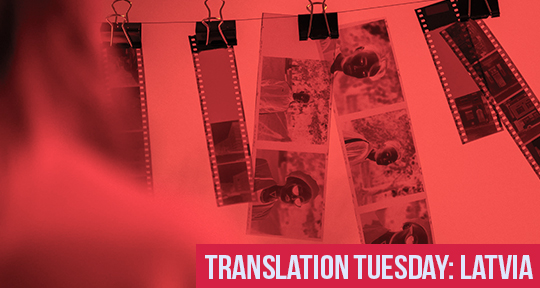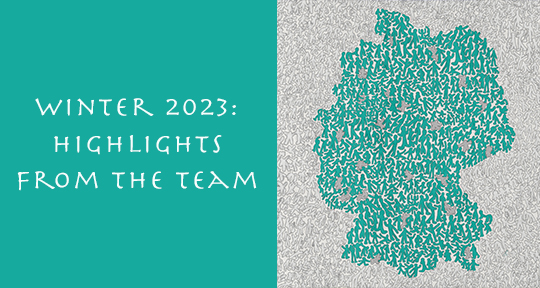I found, as I sat down to read this issue, that what I was hungry for was urgency, vitality, wit and I found pieces that gave me what I was looking for. “There’s No Cure for the Dead” by Nazli Karabiyikoglu (tr. Ralph Hubbell) weaves a breathtakingly complex tapestry, rife with competing rhythms and energies. Selim Özdoğan’s “Seven Difficulties and One Ever-Narrowing Path” (tr. Katy Derbyshire) brought exactly the acerbic, incisive voice I needed. The Alfred Döblin story “The Woman Who Walked In Her Sleep” (tr. Joachim Redner) was filled with great verbs, gestures, colors, sounds, taking the reader on a dizzying trajectory, a plummet, really, from the character swanning about Berlin, showing off his colorful fashion ensemble, to a murderous rag doll come to life. Menke Katz’s poems with their structural challenges around diminishing or growing numbers of syllables and the love of Yiddish had me re-reading them and admiring the translation. And Aco Šopov’s deep, painful poems (tr. Rawley Grau and Christina E. Kramer) after the devastation of the 1963 Skopje earthquake show how despair communicates across decades and has much to say to us about loss and survival now, sixty years later.
—Ellen Elias-Bursac, Contributing Editor
This issue I was particularly blown away by the quality of the interviews published. The César Aira interview conducted by Michal Zechariah is truthfully hilarious, and the line of questioning really allows his trademark wit and absurdism to shine through. I found Geetanjali Shree’s interview with Rose Bialer to be incredibly generous and thoughtful, fascinating and sharp. In both cases, I thought a really strong sense of their writing came through thanks to the interviewers. The visual section brought together two incredible artists—I’m researching the interplay of poetic text and space at the moment, so Lynn Xu’s thinking (teased out by Laura Copelin) really spoke to me, and I appreciated the climate focus of Bahia Shehab’s work, and her interview with Heather Green. Last but certainly not least, I loved Jared Joseph’s review of Johannes Göransson’s Summer. As a researcher, Göransson’s thinking on poetry translation has been incredibly insightful, and I enjoyed the same insights applied to his work, really engaging in depth with poetry as a genre and mode of being. As a bonus, I thought the criticism section was pleasantly varied in terms of geographies and genres!
—Georgina Fooks, Director of Outreach
All the fiction pieces in this issue are truly marvelous, as if they’re in conversation with one another! For example, Kim Cho Yeop’s “Laura” (tr. Sukyoung Sukie Kim) and Dalih Sembiring’s “Floccinaucinihilipilificatius” (tr. Avram Maurits) can be seen as companion pieces, as both stories deal with corporeal limitations and spiritual transcendence. Laura’s sci-fi context, on various conditions related to body dysmorphia, eloquently evokes the plight of non-binary and transgender groups, while Floccinaucinihilipilificatius represents a metaphorical lotus—its trajectory from pain and putrefaction toward the light of maternal love. There’s a sense of metaphysical wonder to both stories—even though one is inspired by science and the other by magical realism. READ MORE…



